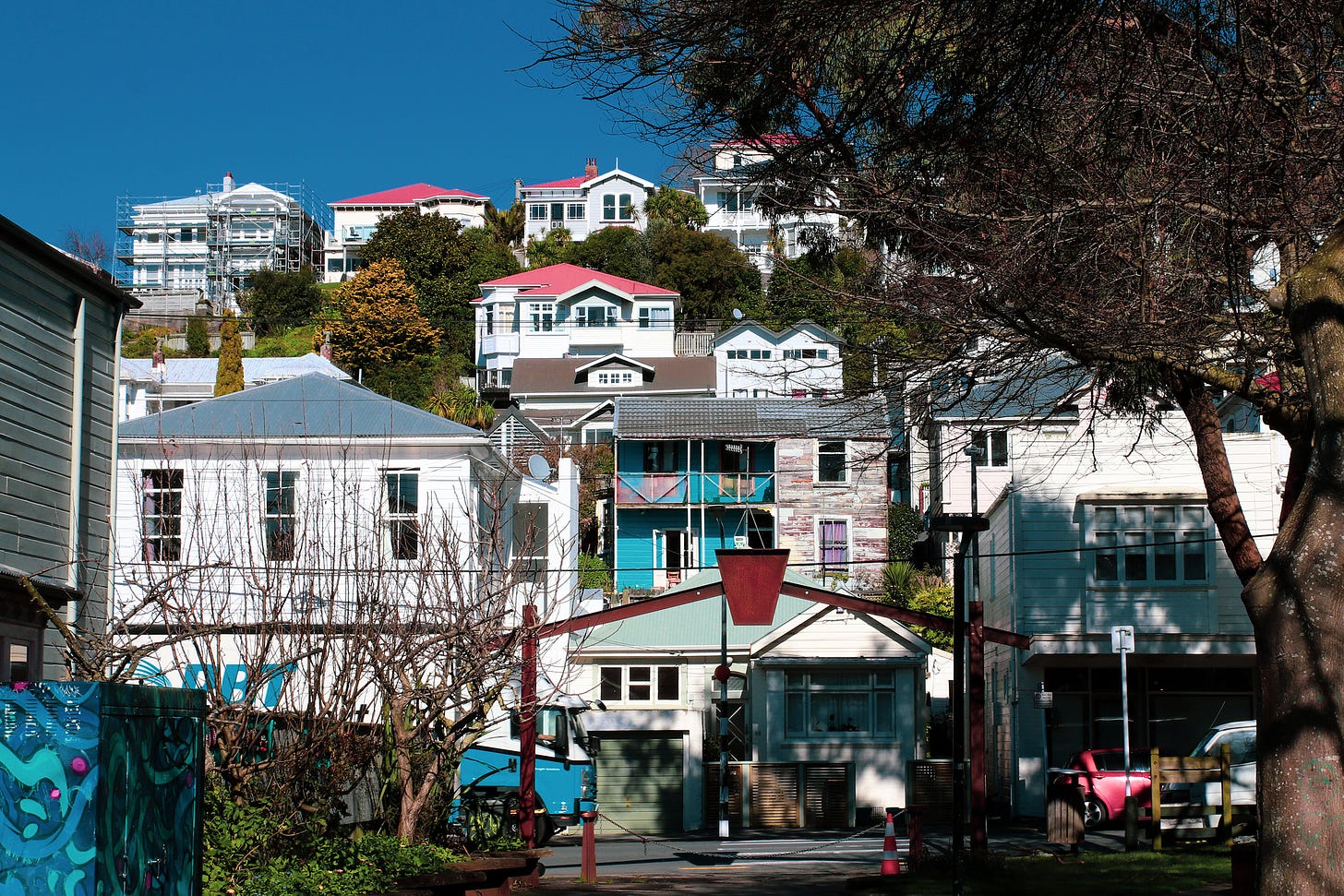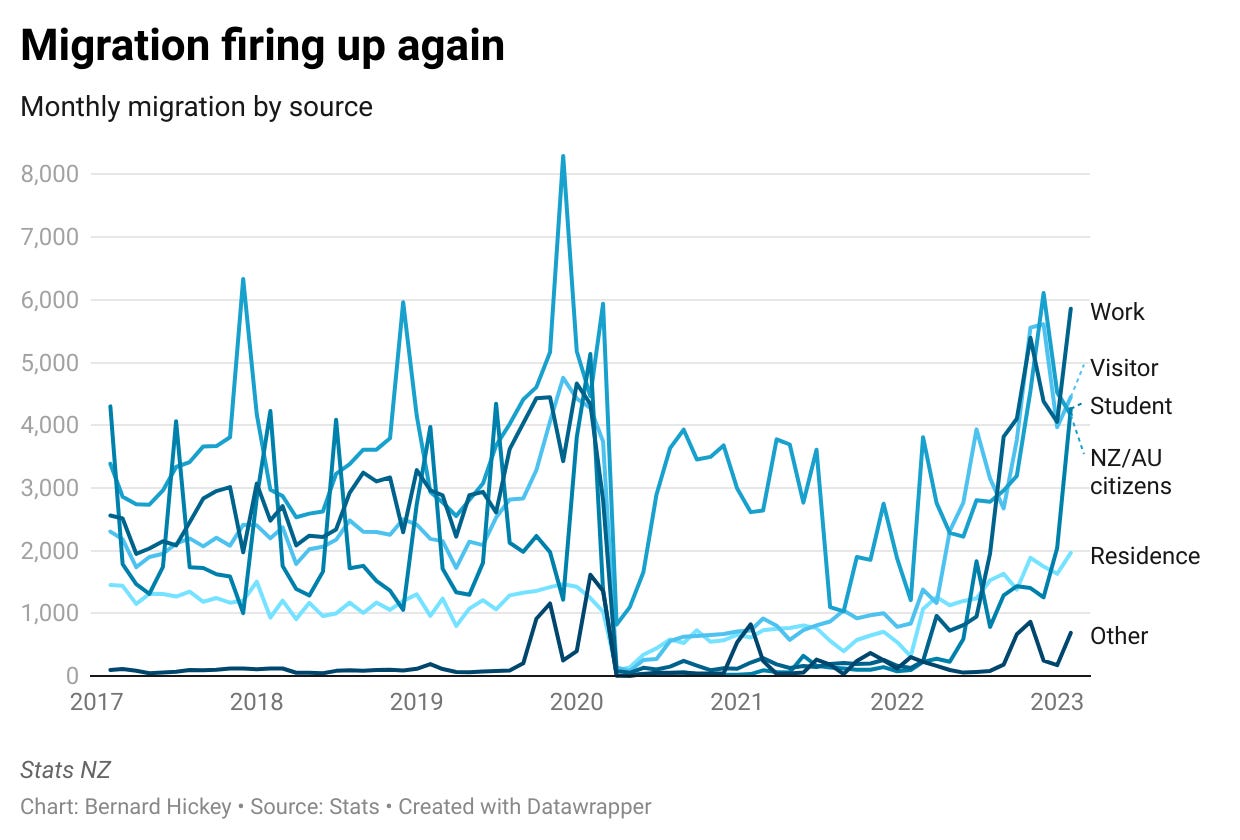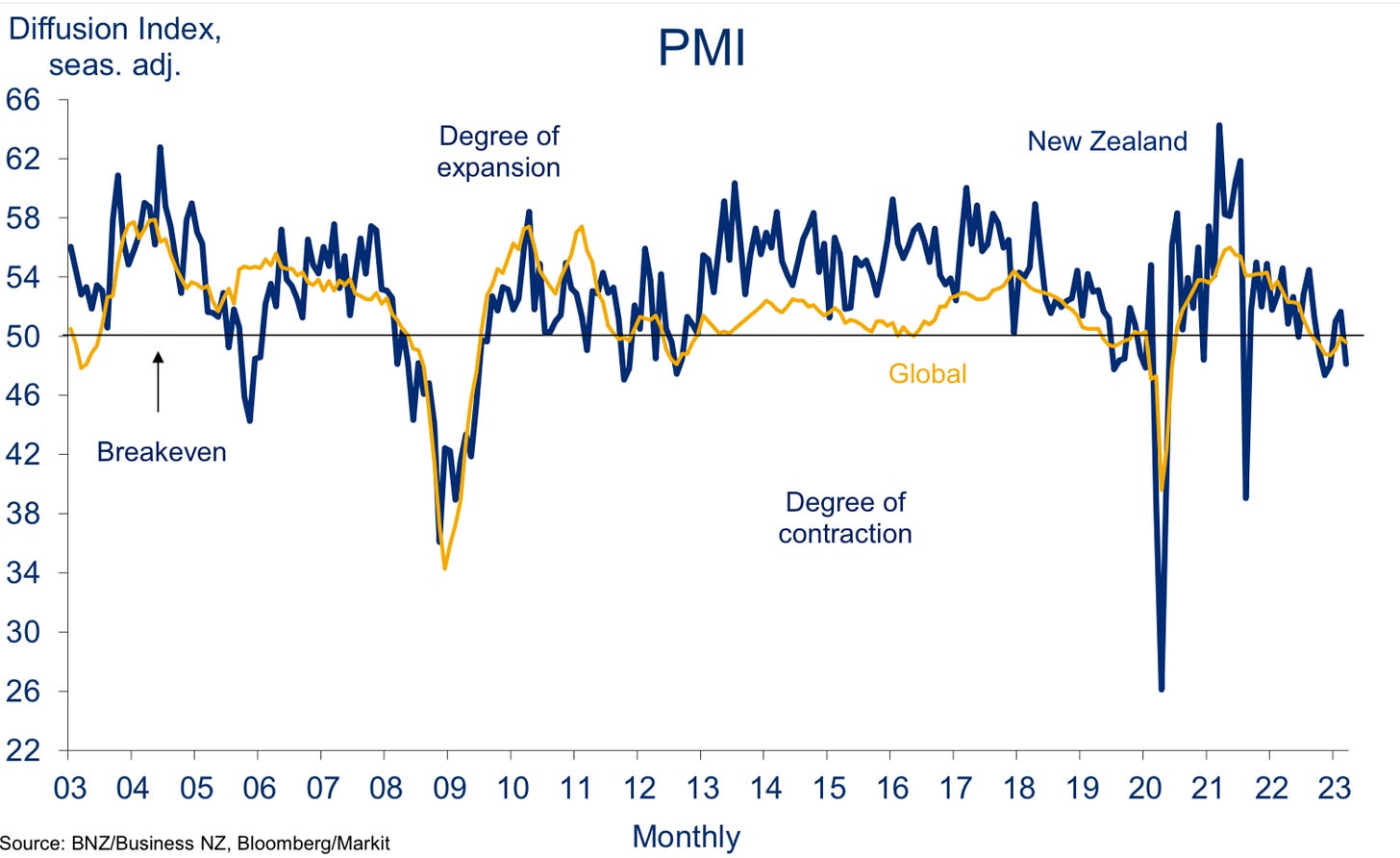
TL;DR: Even when young voters elect councillors and MPs they want with demands for more housing, there are plenty of forces behind the scenes able to subvert that democratic drive and re-establish the ‘democratic deficit’1 behind our housing shortages for decades.
The Dominion Post’s Erin Gourley reported on Saturday via Stuff that Wellington City Council staff had quietly reinserted 797 villas into the Council’s district plan, despite express instructions from Council after a heated debate and vote last year that character zones stopping building be cut by 72%.
Paying subscribers can see more on that below the paywall fold and in the podcasts above. Should I open this up publicly later today? Paying subscribers can comment below.
News elsewhere in our political economy this morning
A democratic deficit in action
There are at least a couple of ways that the interests of young renters have been monstered by older home owners through the planning processes of councils.
Firstly, older home owners in the suburbs and the leafy fringes of our CBDs vote in council elections at much higher rates than young voters and have usually seen their interests represented through policies favouring investment rates well below depreciation rates and zoning decisions in favour of creating more single-storey stand-alone sections for housing. These are the land parcels and zoning rules best suited to maximise leveraged and untaxed capital gains on land value appreciation because the land ownership is clearest (for bank lending purposes) and the land available for land is minimised.
Secondly, council officials appointed over the years by these councillors representing villa owners can overturn or subvert any attempts to densify zoning rules. We have seen it repeatedly in Auckland, where the original 2016 Unitary Plan was watered down with character protection carveouts, and where the most recent MDRS up-zoning was gutted by excluding the leafiest suburbs of Mt Eden, Ponsonby, Grey Lynn and Remuera from the plan, along with a swathe all along the planned corridor for the Auckland to Mangere line. Even this has been delayed for another year because of the effects on officials of the January and February floods.
The best description of how this democratic deficit works has come repeatedly from the Productivity Commission as it pointed out how infrastructure investment and down-zoning have starved cities of land for residential housing to keep up with the fastest population growth in the developed world in the last 20 years.
There’s a fresh example over the weekend of how officials do the bidding of suburban land-owning voters, who are overwhelmingly old and rich.
The Dominion Post’s Erin Gourley reported on Saturday via Stuff that Wellington City Council staff had quietly reinserted 797 villas into the Council’s district plan, despite express instructions from Council after a heated debate and vote last year that character zones stopping building be cut by 72%.
Councillors are surprised to find that Council staff did not follow a decision they made about removing homes from Wellington's character precincts last year.
Last year the Council voted that character precincts – where it is difficult to develop new housing because they contain many protected, pre-1930s villas – should be reduced by 72%. In doing so, they rejected advice from Council staff suggesting a more moderate reduction in the precincts.
But that’s not what Council staff recommended to the commissioners hearing submissions on the district plan. They asked commissioners to add 1000 houses back into the protected zones, going back to the recommendation which the Council voted against.
Sean Audain, strategic planning manager at the Council, said the recommendation was made because the council’s staff were bound to give their honest, expert assessment of the plan no matter who they were representing.
In this case the experts decided there simply wasn’t enough evidence to justify reducing the character precincts as much as the Council wanted.
The change recommended by officers would housing capacity by about 797 units and “does not have a significant impact on the overall residential housing capacity”, he said. Stuff
Here’s another example that emerged over the weekend from Blenheim’s Local Democracy Reporter Maia Hart. The headline framing is unfortunate. 'Brutal' and 'unattractive' duplex gets green light amid housing shortage
Maia reported the duplex was approved, but only after objections from the Council’s own staff.
Marlborough District Council environment planner Ian Sutherland recommended the consent be declined, raising issues with the “unattractive” structure, described as having “little interesting features”.
Sutherland said, according to the resource consent decision released this month, the “doubling of density” would have adverse effects on the amenity values and character of the street, such as extra noise and reducing neighbours’ privacy.
His concerns were in line with neighbours who opposed it over concerns of increased noise and traffic, shade from the building’s height, parking congestion, and the building’s appearance.
A resource management consultant on behalf of a resident also recommended the application be declined, saying the development’s density was too high, given the “existing character” of the area.
He said the design was “brutal”, lacked visual interest and was “essentially a square shape”. Stuff
I’ll follow up on this later today. I welcome suggestions from paying subscribers about avenues for investigation, including examples of this democratic deficit. Meanwhile, here’s a good backgrounder from Erin Gourley on how it has worked in Wellington.
Scoops elsewhere
(Not so) funny guy - Andrea Vance had the scoop in the Sunday Star Times about National Taieri candidate Stephen Jack posting a sexist joke on Facebook. I won’t repeat it.
The random idiot generator that selects National Party candidates has spat out another couple of beauties. (After Stuff contacted National on Friday, Jack acknowledged the video he shared was “offensive” and removed it.) Andrea Vance.
‘There’s no room left’ - Some frontline police have been told to “consider necessity of arrests” in some circumstances because one of the country’s largest prisons is nearly full. Herald on Sunday (Sam Sherwood)
‘There’s no staff left’ - Hospital employees in New Zealand filed more than 23,000 formal reports warning of unsafe levels of staffing in the past three years, a Weekend Herald investigation has found. (Alex Spence)
Dental surgeries down 80% - Christchurch Hospital dental service Lester Settle told The Press’ Kristie Boland that staff shortages had cut surgeries from 22 a month to five, which meant children needing dental surgery under general anaesthesia are instead being sent home with antibiotics and pain relief. The Press
Councils suspending insulation loans - Environment Canterbury’s loan scheme to help keep homes warm and dry has been on hold for more than two years, with no indications of when – or if – it will resume, or whether the council will have to refund any money. Stuff (Keiller MacDuff) This is all because the Commerce Commission has found councils may have ‘over-lent’ to people who could not afford the loans under the CCCFA.
In 2022, Waikato regional councillors signalled they planned to lobby the government for a CCCFA exemption for council voluntary targeted rate (VTR) schemes such as their own Eco Retrofit programme.
A spokesperson said the former Minister of Commerce, David Clark had been receptive, indicating he would ask officials for regulatory analysis before taking a proposal to Cabinet.
But following January’s Cabinet reshuffle, the council is still “awaiting an update on new Minister Duncan Webb’s position”.
The end result here is one arm of Government policy designed to make homes warmer, drier and emit less, is being blocked by another arm of policy designed to stop banks and loan sharks from abusive lending. These should have been grants, rather than loans, in my view.
Notables elsewhere
The campaign worked - The Otago Daily Times has been running a campaign to get $100 million of funding cuts for the new Otago hospital overturned. That worked. Keiller MacDuff reported for Stuff on Friday night from this announcement.
‘Down the drain’ - A mother of four has been plunged further into debt after her government-provided home was ruined in the Auckland floods and Kāinga Ora and MSD could not agree who should pay to replace her belongings. Jonathan Killick reported for Stuff that Jayde Jones’s Kāinga Ora home was built on a flood plain, and lifted off its foundations when a historic deluge swept across the city.
‘Cut the red tape for me’ - Property developer Chris Meehan gave an interview to NZ Herald Editor at Large Shayne Currie that was published in the Weekend Herald-$$$ after Meehan’s Winton Land published a bunch of full-page ads in newspapers calling on the Government and PM Chris Hipkins in particular to cut red tape to allow him to build more houses.
$1.2m a week - Auckland Light Rail (ALR) is paying about $920,000 a week to two engineering companies to plan and design the central city-to-airport light rail project and a further $310,000 to its own contractors and consultants. NZ Herald (Bernard Orsman)
Millions extra in the bank - A number of charities have millions of dollars more in cash on hand than they had the year before. Stuff (Ged Cann)
Housing shortages - International students are returning in large numbers, but finding them homes is proving a challenge. Stuff (Gianina Schwanecke)
Tax switch? - Thomas Coughlan suggested in his NZ Herald-$$$ column over the weekend that two reports are coming that could suggest the Government is looking at a ‘tax switch’ election policy.
In 2021, Revenue Minister David Parker secured funding to research the level of tax paid by New Zealand’s wealthiest individuals. The data on this subject is incredibly poor, and means we have little knowledge of how much tax our wealthiest do or do not pay.
A draft report has landed and the final one has been publicly signalled for release by the end of this month. If it’s anything like an earlier attempt at this research from 2020, it’s likely to show that almost 40 per cent New Zealand’s wealthiest pay less than 10 per cent of their total incomes in tax.
What is less well-known is that the Government is planning to release at the same time results from another parallel report by Treasury, which aims to calculate the amount of tax paid by “regular” people across the wealth spectrum.
This would work out how much tax an ordinary person would pay on their earnings through income tax, but also in their expenditure, like GST.
The idea will be to contrast the raw tax deal ordinary people get, with the good deal enjoyed by the wealthy.
The fact that both of these reports will be released weeks before the Budget has raised eyebrows. So too, did comments from Finance Minister Grant Robertson to Stuff last month when he loosely gestured towards a proposal from the Tax Working Group for a “tax switch”: cutting tax rates by lifting the bottom two rates of income tax, funded by raising taxes on the wealthy (in this case via a Capital Gains Tax). That specific policy might not get the green light – but something like it might. NZ Herald-$$$ (Thomas Coughlan)
The Timaru and Waimakariki district councils have filed an appeal against a high court ruling on their ownership rights over “three waters” assets. BusinessDesk-$$$ (Greg Hurrell)
National MP prefers potholes fixed to lowering speed limits outside schools The Pres
In the raw: reports, papers, interviews & documents
Half our lakes unhealthy - Lakes380, the publicly funded research into water quality by GNS Science and the the Cawthron Institute, released its initial results yesterday. It found nearly half of the lakes were in poor health. Stuff, RNZ, 1News
Six months in motels - MSD reported in its latest housing metrics report that 3,417 households were in emergency accommodation, such as motels, as of March 31, including 3357 children, with just under $30m paid out in grants during the month. The average stay in emergency accommodation rose 26 weeks from 21 weeks a year ago and three weeks in 2018. NZ Herald (Michael Neilson)
Kieran McAnulty defends Three Waters
Wayne Brown says he’s not a hugger
An Australian post-mortem - Prominent Australian macro-economist Chris Murphy has published an in-depth analysis of Australia’s fiscal and monetary responses to covid in this Economic Society of Australia paper, which found for every $1 of income the private sector lost under covid, fiscal policy provided $2 of compensation. He also found the after effects of over-compensation and over-prolonged loose monetary policy generated excess demand that temporarily added up to three percentage points to the annual inflation rate.
Quotes of the day
He’s a fixer, not a hugger
'“Nobody died because of lack of empathy. They died because of a lack of planning of where they're living and the stormwater management.” Auckland Mayor Wayne Brown in a Q+A interview with Jack Tame yesterday. 1News (Also see full video above)
Morning Chris
“I am an Energizer Bunny. I get up at 4.30 every morning. I go seven days a week.” Christopher Luxon talking to farmers in Morrinsville last week. Stuff
Chris Meehan to Chris Hipkins
“All we need is your scissors for that red tape. What do you say Chippy? Will you sit down and hammer out a plan? We’ll bring the biscuits.” Winton Land’s Chris Meehan in a full page ad placed over the weekend and this morning in newspapers.
‘Short French leader stands out in a crowd’
“Being an ally does not mean being a vassal.” France’s President Emmanuel Macron explaining his comments suggesting Europe take a different stance on Taiwan to the United States, which created an uproar. FT2
Tory Whanau to National and Labour
“I want it in writing.” Wellington Mayor Tory Whanau telling Tom Hunt at the Dominion Post she was meeting with politicians from National and Labour and would use all the leverage she had to get funding agreements ahead of the October 14 General Election.
People news
Auckland Council chief executive Jim Stabback left council headquarters to go home shortly before 5pm on the night of the Auckland Anniversary floods when the emergency response to the lethal downpour would have been at its peak. NZ Herald (Tom Dillane and Bernard Orsman)
Lyttelton Port CEO Kirstie Gardener suddenly resigned on Friday, less than a year into the top job and after a clash with her board. The Press
NZ First will try to claw its way back into Parliament by running a “two-tick” campaign in Northland through veteran MP Shane Jones. NZ Herald (Thomas Coughlan)
SPCA CEO Gabby Clezy resigned for personal reasons seven months into the job via an email to staff late on Thursday. Stuff (Mildred Armah)
Charts of the day
Record-high monthly net migration in February
The net migration gain of 13,200 non-New Zealand citizens in February was provisionally the highest for any month, just exceeding February 2020 (13,000), Stats NZ reported on Friday. There have been 11 consecutive months of net migration gains of non-New Zealand citizens from April 2022, amounting to 69,600, vs net migration loss of 32,300 non-New Zealand citizens in the 24 months from April 2020 to March 2022 during covid restrictions. There have been 16 consecutive months of net migration losses of New Zealand citizens to February 2023, totalling 23,400, and following 27 months of mainly net migration gains of New Zealand citizens totalling 32,100 from August 2019 to October 2021.
Manufacturing contracted in March
The BNZ BusinessNZ Manufacturing PMI survey for March published on Friday showed the manufacturing sector contracted after two months of expansion. The PMI showed a seasonally adjusted reading of 48.1 (a reading under 50 shows contraction), after readings of 51.7 and 51.0 in February and January respectively. The reading for production of 43.3 was the lowest monthly figure since 2009 outside of pandemic lockdowns.
Milestones
As Germany ends nuclear era, activist says there is still more to do Reuters
G7 ministers set big new targets for solar and wind capacity Reuters
'Era has passed' as Beijing subway drops mandatory COVID mask rule Reuter
My diary for this week
Today - Stats NZ is scheduled to publish food and rent indices for March at 10.45 am
Tuesday April 18 - REINZ is scheduled to publish its March sales results at 9 am NZ Time. RBNZ is scheduled to report its balance sheet data to the end of March at 3pm.
Thursday April 20 - Stats NZ is scheduled to publish Consumer Price Inflation data for the March quarter at 10.45 am
Friday April 21 - The RBNZ is scheduled to publish its half-yearly Credit Conditions Survey data for March at 3pm.
Ka kite ano
Bernard
Cited by the Productivity Commission again in its February 2020 Local Government Insights document (page 16): “A democratic deficit at the local level: Homeowners have considerable influence in local body elections and are often strongly represented in community consultation processes. Their influence promotes council decisions that restrict urban intensification and the supply of new land for housing. By contrast, those bearing the negative outcomes of councils’ planning and funding decisions are not well represented in either community engagement or local elections. People who tend to be under- represented include those who are younger (particularly those aged under 25), Māori, Pasifika, and renters – groups more likely to suffer from a lack of affordable housing.”
Gift link to FT article. It will open three times. I have 20 of these to use each month.













Share this post